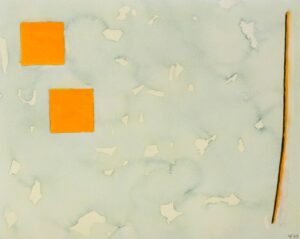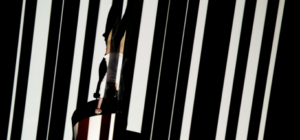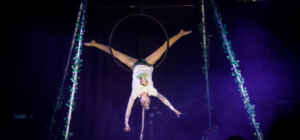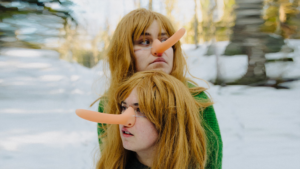
London Clown Festival
We’re delighted to be a venue for the acclaimed London Clown Festival for the first time. Here are six shows that are influenced by mime, circus and physical comedy. Don’t miss this eclectic mix of performers who embody the principals of this timeless art form from countries all over the world – this is clowning for the 21st century.
Troll by Marie Kallevik Straume & Anna Marie Simonsen
Troll is an “irresistibly silly” (★★★★ The Guardian) two-troll clown comedy about connection, scape(goat)ing and being misunderstood. Fed up with years of misrepresentation, villainization and exclusion, two trolls find themselves at Jacksons Lane, ready and desperate to tell their side of the story and the truth about those three goats.
Inspired by Norwegian folklore, Troll is a critically-acclaimed comedy and heartwarming mash-up of music, storytelling, audience interaction, physical theatre and clown.

London Clown Festival
We’re delighted to be a venue for the acclaimed London Clown Festival for the first time. Here are six shows that are influenced by mime, circus and physical comedy. Don’t miss this eclectic mix of performers who embody the principals of this timeless art form from countries all over the world – this is clowning for the 21st century.
Lost Cabaret: A cacophony of clowns by Lost Cabaret International Clown Collective
★★★★ ENTERTAINMENT NOW
“Lost Cabaret is a magical world to be utterly treasured”
A ridiculous clown variety show featuring the visually absurd, the whimsically witty and the wildly beautiful.
Foolishness wrapped in a warm hug, Lost Cabaret is an alt-comedy garden of enchantment that began in London circa 2012 and was instrumental for the growth of many clown artists that you all love today. Lost has bloomed in venues all across the world, selling out festivals from Edinburgh to Adelaide and loads of cities in between.

Edinburgh Fringe Previews
Three bold and hilarious performances that are destined to take over Fringe this summer.
Ironing Board Man
Jody Kamali
Saturday 20 Jul at 7.30pm
Tickets: £10
https://www.jacksonslane.org.uk/events/ironing-board-man/
Jody Kamali is Jeremy Irons in IRONING BOARD MAN!
One man. Eight ironing boards. One epic soundtrack. Watch in awe as Jody cleverly transforms these everyday household items into the tools of an epic, action-packed Hollywood romance. Ironing Board Man is an inventive physical comedy show that “demands applause” (The Scotsman).
Nominated for Best Comedy Show Buxton Fringe 2022 and Best Show Brighton Fringe 2021.

London Clown Festival
We’re delighted to be a venue for the acclaimed London Clown Festival for the first time. Here are six shows that are influenced by mime, circus and physical comedy. Don’t miss this eclectic mix of performers who embody the principals of this timeless art form from countries all over the world – this is clowning for the 21st century.
Tomatoes Don’t Fly by Jose Parra
Ignacio has discovered something that could change his life forever. But he doesn’t know how to tell his partner Maria. As he prepares a tomato soup at home, he enters another dimension where he becomes both a children’s clown in crisis and an inspirational speaker. Ignacio will learn something that will help him take the next step in his life.

Edinburgh Fringe Previews
Three bold and hilarious performances that are destined to take over Fringe this summer.
Fame Hungry
Louise Orwin
Wednesday 24 Jul at 7.30pm
Tickets: £10
https://www.jacksonslane.org.uk/events/fame-hungry/
FAMEHUNGRY is a helter-skelter nose-dive into the TikTok universe, the attention economy and what it means to be an artist now. Fusing performance art and very real and very live TikTok Experiences, join award-winning performance artist Louise Orwin as she cosplays as a TikToker in a real-life experiment hunting for fame and fortune.

London Clown Festival
We’re delighted to be a venue for the acclaimed London Clown Festival for the first time. Here are six shows that are influenced by mime, circus and physical comedy. Don’t miss this eclectic mix of performers who embody the principals of this timeless art form from countries all over the world – this is clowning for the 21st century.
Mel McGlensey is Motorboat by Mel McGlensey
WINNER: Best Comedy weekly award Adelaide Fringe Festival 2024
Batten down the hatches and seal your porthole! It’s time for the silliest, most outrageous, naughty and nautical show ever made about someone who is part boat, part woman… and full clown.
Come with Motorboat on a sea voyage of self-discovery, silliness and stupidity.

Edinburgh Fringe Previews
Three bold and hilarious performances that are destined to take over Fringe this summer.
Silly Little Things
Trygve Wakenshaw
Saturday 27 Jul at 7.30pm
Tickets: £10
https://www.jacksonslane.org.uk/events/silly-little-things/
After a seven-year hiatus from the Fringe, Trygve Wakenshaw returns with his new hilarious mime-clown-comedy show. Light and silly, absurd and Dada, and a sort of autobiographical, introspective look at all the silly little things that can make or break a friendship.
Trygve Wakenshaw is an award-winning and internationally-recognised mime clown. In 2015 he was nominated for Best Comedy Show at the Edinburgh Comedy Awards and in 2017 he sold out at the Fringe with Trygve Versus A Baby.
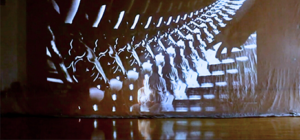
Transmission Residency Series
Jacksons Lane’s annual residencies and work-in-progress sharings of new circus and physical theatre returns, with tickets just £1
Bending Reality
Nua Dance
Friday 2 Aug at 4pm
Tickets: £1
https://www.jacksonslane.org.uk/events/bending-reality/
By using play and wonder, dance, circus, video design, impossible perspectives and extreme physicality, Bending Reality encourages you to stay open to the idea that things and people might be different from what you originally thought.

Transmission Residency Series
Jacksons Lane’s annual residencies and work-in-progress sharings of new circus and physical theatre returns, with tickets just £1
Lotte
Akimbo Theatre
Friday 16 Aug at 4pm
Tickets: £1
https://www.jacksonslane.org.uk/events/lotte/
1920’s Berlin. Eleven years before Disney made Snow White, German filmmaker Lotte Reiniger pioneered multiplane shadow puppetry and animation.
Mixing theatre, dance, acrobatics, shadow puppetry and movement, Akimbo Theatre tell the story of Lotte Reiniger and her revolutionary work in film and animation, turning fairytales into feature-length magic.
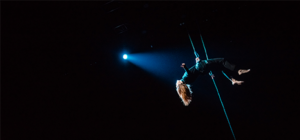
Transmission Residency Series
Jacksons Lane’s annual residencies and work-in-progress sharings of new circus and physical theatre returns, with tickets just £1
Itch
Gildas Aleksa
Saturday 31 Aug at 4pm
Tickets: £1
https://www.jacksonslane.org.uk/events/itch/
We weren’t here before we were born, and we won’t be here after we die.
It’s terrifying, but at least we’re in this together.
Itch is a new circus and theatre show that tackles our fear of death and the existential anxiety that grips us all. Blending philosophical and psychoanalytical ideas with juggling, acro dance and aerial dancing, Itch invites us to confront the ultimate truth of our mortality.

Sunday 8 September at 11am & 2pm
Tickets: £14 | Suitable for ages 2-6
Join Shoe Baby on a fantastical sing-along journey as this baby explores the sea, the air, and the zoo – all from the comfort of a shoe! and featuring music by Tom Gray of Gomez, this 30-minute show is perfect for children aged 2-6.
After the show, enjoy 20 minutes of play and fun activities including a shoe shop, a giant shoe, and a make-a-town scene.
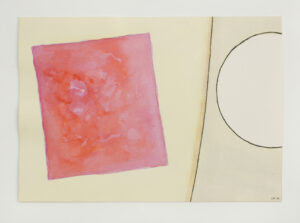
This exhibition, Cuillin Bantock’s fourth at Highgate Gallery, will be the culmination of sixty five years of
experience as a visual artist.
Bantock’s work is all landscape-based. Life-long familiarity with a particular coastal sand-dune system in North
Wales is a persistent point of reference. His choice of media is wide-ranging and includes oil paint, acrylic, gouache,
conte and linocut. His approach has shifted from representation to abstraction, but he strongly believes that all
art must relate to something outside itself.
The exhibition will show two types of work: Indian Ink drawings, and watercolour paintings.
The Indian ink drawings are from the 2022 series ‘Forty-one approaches to a View’. The ‘view’ is of a particular
duneland studied repeatedly from the same spot. The emphasis has been on making quite simple statements
about that particular space. The first studies that Bantock made of this terrain (also in Indian ink) date from 1961.
It was only while making the recent drawings in 2022 that he realised that other artists, in their later years,
had adopted a similar approach; for example Hokusai, with his ‘Thirty Six Views of Mount Fuji’.
The watercolours were made between 2020 and 2024. These are derived from the same landscape as the
ink drawings, but with a particular emphasis on pictorial space (through flatness) and pictorial light
(through colour), but handled abstractly without reference to specific locales. To some extent the watercolours
are a new departure for Bantock. His only previous experience with the medium was very occasional figurative
work (again, of duneland). He describes watercolour as ‘the most challenging medium of all.’
The two bodies of work are united by a perennial search for clarity of execution and expression, and pictorial economy
free of didacticism, leaving room for spontaneity.
Cuillin Bantock has enjoyed a rich and varied career as artist, scientist, educator and writer. He is an Oxford-trained
zoologist who worked as a professional biologist for 20 years, and later studied at Camberwell College of Art. He has
written and lectured extensively on a wide range of subjects, including science, wildlife conservation, art and artists.
His work has been exhibited widely over many years, and is held in a large number of private and corporate collections.
Highgate Gallery is delighted to be hosting this exhibition, which Bantock has decided – as he approaches
his ninetieth birthday – shall be his last with us.
Gallery open: Wed – Fri: 13.00 – 17.00, Sat: 11.00 – 16.00, Sun: 11.00 -17.00

This exhibition, Cuillin Bantock’s fourth at Highgate Gallery, will be the culmination of sixty five years of
experience as a visual artist.
Bantock’s work is all landscape-based. Life-long familiarity with a particular coastal sand-dune system in North
Wales is a persistent point of reference. His choice of media is wide-ranging and includes oil paint, acrylic, gouache,
conte and linocut. His approach has shifted from representation to abstraction, but he strongly believes that all
art must relate to something outside itself.
The exhibition will show two types of work: Indian Ink drawings, and watercolour paintings.
The Indian ink drawings are from the 2022 series ‘Forty-one approaches to a View’. The ‘view’ is of a particular
duneland studied repeatedly from the same spot. The emphasis has been on making quite simple statements
about that particular space. The first studies that Bantock made of this terrain (also in Indian ink) date from 1961.
It was only while making the recent drawings in 2022 that he realised that other artists, in their later years,
had adopted a similar approach; for example Hokusai, with his ‘Thirty Six Views of Mount Fuji’.
The watercolours were made between 2020 and 2024. These are derived from the same landscape as the
ink drawings, but with a particular emphasis on pictorial space (through flatness) and pictorial light
(through colour), but handled abstractly without reference to specific locales. To some extent the watercolours
are a new departure for Bantock. His only previous experience with the medium was very occasional figurative
work (again, of duneland). He describes watercolour as ‘the most challenging medium of all.’
The two bodies of work are united by a perennial search for clarity of execution and expression, and pictorial economy
free of didacticism, leaving room for spontaneity.
Cuillin Bantock has enjoyed a rich and varied career as artist, scientist, educator and writer. He is an Oxford-trained
zoologist who worked as a professional biologist for 20 years, and later studied at Camberwell College of Art. He has
written and lectured extensively on a wide range of subjects, including science, wildlife conservation, art and artists.
His work has been exhibited widely over many years, and is held in a large number of private and corporate collections.
Highgate Gallery is delighted to be hosting this exhibition, which Bantock has decided – as he approaches
his ninetieth birthday – shall be his last with us.
Gallery open: Wed – Fri: 13.00 – 17.00, Sat: 11.00 – 16.00, Sun: 11.00 -17.00

Rosy’s onstage career is built on her gleeful frankness about her sex life with men. Now newly single at forty, and advising her teenage daughter about relationships, Rosy wonders if revisiting hyper-macho desires could restore her sexual power, or if there’s a more uncomfortable truth to face.
“A startling, laugh out loud funny and erudite examination of age, relationships and female sexuality” — What’s On Stage

This exhibition, Cuillin Bantock’s fourth at Highgate Gallery, will be the culmination of sixty five years of
experience as a visual artist.
Bantock’s work is all landscape-based. Life-long familiarity with a particular coastal sand-dune system in North
Wales is a persistent point of reference. His choice of media is wide-ranging and includes oil paint, acrylic, gouache,
conte and linocut. His approach has shifted from representation to abstraction, but he strongly believes that all
art must relate to something outside itself.
The exhibition will show two types of work: Indian Ink drawings, and watercolour paintings.
The Indian ink drawings are from the 2022 series ‘Forty-one approaches to a View’. The ‘view’ is of a particular
duneland studied repeatedly from the same spot. The emphasis has been on making quite simple statements
about that particular space. The first studies that Bantock made of this terrain (also in Indian ink) date from 1961.
It was only while making the recent drawings in 2022 that he realised that other artists, in their later years,
had adopted a similar approach; for example Hokusai, with his ‘Thirty Six Views of Mount Fuji’.
The watercolours were made between 2020 and 2024. These are derived from the same landscape as the
ink drawings, but with a particular emphasis on pictorial space (through flatness) and pictorial light
(through colour), but handled abstractly without reference to specific locales. To some extent the watercolours
are a new departure for Bantock. His only previous experience with the medium was very occasional figurative
work (again, of duneland). He describes watercolour as ‘the most challenging medium of all.’
The two bodies of work are united by a perennial search for clarity of execution and expression, and pictorial economy
free of didacticism, leaving room for spontaneity.
Cuillin Bantock has enjoyed a rich and varied career as artist, scientist, educator and writer. He is an Oxford-trained
zoologist who worked as a professional biologist for 20 years, and later studied at Camberwell College of Art. He has
written and lectured extensively on a wide range of subjects, including science, wildlife conservation, art and artists.
His work has been exhibited widely over many years, and is held in a large number of private and corporate collections.
Highgate Gallery is delighted to be hosting this exhibition, which Bantock has decided – as he approaches
his ninetieth birthday – shall be his last with us.
Gallery open: Wed – Fri: 13.00 – 17.00, Sat: 11.00 – 16.00, Sun: 11.00 -17.00

This exhibition, Cuillin Bantock’s fourth at Highgate Gallery, will be the culmination of sixty five years of
experience as a visual artist.
Bantock’s work is all landscape-based. Life-long familiarity with a particular coastal sand-dune system in North
Wales is a persistent point of reference. His choice of media is wide-ranging and includes oil paint, acrylic, gouache,
conte and linocut. His approach has shifted from representation to abstraction, but he strongly believes that all
art must relate to something outside itself.
The exhibition will show two types of work: Indian Ink drawings, and watercolour paintings.
The Indian ink drawings are from the 2022 series ‘Forty-one approaches to a View’. The ‘view’ is of a particular
duneland studied repeatedly from the same spot. The emphasis has been on making quite simple statements
about that particular space. The first studies that Bantock made of this terrain (also in Indian ink) date from 1961.
It was only while making the recent drawings in 2022 that he realised that other artists, in their later years,
had adopted a similar approach; for example Hokusai, with his ‘Thirty Six Views of Mount Fuji’.
The watercolours were made between 2020 and 2024. These are derived from the same landscape as the
ink drawings, but with a particular emphasis on pictorial space (through flatness) and pictorial light
(through colour), but handled abstractly without reference to specific locales. To some extent the watercolours
are a new departure for Bantock. His only previous experience with the medium was very occasional figurative
work (again, of duneland). He describes watercolour as ‘the most challenging medium of all.’
The two bodies of work are united by a perennial search for clarity of execution and expression, and pictorial economy
free of didacticism, leaving room for spontaneity.
Cuillin Bantock has enjoyed a rich and varied career as artist, scientist, educator and writer. He is an Oxford-trained
zoologist who worked as a professional biologist for 20 years, and later studied at Camberwell College of Art. He has
written and lectured extensively on a wide range of subjects, including science, wildlife conservation, art and artists.
His work has been exhibited widely over many years, and is held in a large number of private and corporate collections.
Highgate Gallery is delighted to be hosting this exhibition, which Bantock has decided – as he approaches
his ninetieth birthday – shall be his last with us.
Gallery open: Wed – Fri: 13.00 – 17.00, Sat: 11.00 – 16.00, Sun: 11.00 -17.00

This exhibition, Cuillin Bantock’s fourth at Highgate Gallery, will be the culmination of sixty five years of
experience as a visual artist.
Bantock’s work is all landscape-based. Life-long familiarity with a particular coastal sand-dune system in North
Wales is a persistent point of reference. His choice of media is wide-ranging and includes oil paint, acrylic, gouache,
conte and linocut. His approach has shifted from representation to abstraction, but he strongly believes that all
art must relate to something outside itself.
The exhibition will show two types of work: Indian Ink drawings, and watercolour paintings.
The Indian ink drawings are from the 2022 series ‘Forty-one approaches to a View’. The ‘view’ is of a particular
duneland studied repeatedly from the same spot. The emphasis has been on making quite simple statements
about that particular space. The first studies that Bantock made of this terrain (also in Indian ink) date from 1961.
It was only while making the recent drawings in 2022 that he realised that other artists, in their later years,
had adopted a similar approach; for example Hokusai, with his ‘Thirty Six Views of Mount Fuji’.
The watercolours were made between 2020 and 2024. These are derived from the same landscape as the
ink drawings, but with a particular emphasis on pictorial space (through flatness) and pictorial light
(through colour), but handled abstractly without reference to specific locales. To some extent the watercolours
are a new departure for Bantock. His only previous experience with the medium was very occasional figurative
work (again, of duneland). He describes watercolour as ‘the most challenging medium of all.’
The two bodies of work are united by a perennial search for clarity of execution and expression, and pictorial economy
free of didacticism, leaving room for spontaneity.
Cuillin Bantock has enjoyed a rich and varied career as artist, scientist, educator and writer. He is an Oxford-trained
zoologist who worked as a professional biologist for 20 years, and later studied at Camberwell College of Art. He has
written and lectured extensively on a wide range of subjects, including science, wildlife conservation, art and artists.
His work has been exhibited widely over many years, and is held in a large number of private and corporate collections.
Highgate Gallery is delighted to be hosting this exhibition, which Bantock has decided – as he approaches
his ninetieth birthday – shall be his last with us.
Gallery open: Wed – Fri: 13.00 – 17.00, Sat: 11.00 – 16.00, Sun: 11.00 -17.00

This exhibition, Cuillin Bantock’s fourth at Highgate Gallery, will be the culmination of sixty five years of
experience as a visual artist.
Bantock’s work is all landscape-based. Life-long familiarity with a particular coastal sand-dune system in North
Wales is a persistent point of reference. His choice of media is wide-ranging and includes oil paint, acrylic, gouache,
conte and linocut. His approach has shifted from representation to abstraction, but he strongly believes that all
art must relate to something outside itself.
The exhibition will show two types of work: Indian Ink drawings, and watercolour paintings.
The Indian ink drawings are from the 2022 series ‘Forty-one approaches to a View’. The ‘view’ is of a particular
duneland studied repeatedly from the same spot. The emphasis has been on making quite simple statements
about that particular space. The first studies that Bantock made of this terrain (also in Indian ink) date from 1961.
It was only while making the recent drawings in 2022 that he realised that other artists, in their later years,
had adopted a similar approach; for example Hokusai, with his ‘Thirty Six Views of Mount Fuji’.
The watercolours were made between 2020 and 2024. These are derived from the same landscape as the
ink drawings, but with a particular emphasis on pictorial space (through flatness) and pictorial light
(through colour), but handled abstractly without reference to specific locales. To some extent the watercolours
are a new departure for Bantock. His only previous experience with the medium was very occasional figurative
work (again, of duneland). He describes watercolour as ‘the most challenging medium of all.’
The two bodies of work are united by a perennial search for clarity of execution and expression, and pictorial economy
free of didacticism, leaving room for spontaneity.
Cuillin Bantock has enjoyed a rich and varied career as artist, scientist, educator and writer. He is an Oxford-trained
zoologist who worked as a professional biologist for 20 years, and later studied at Camberwell College of Art. He has
written and lectured extensively on a wide range of subjects, including science, wildlife conservation, art and artists.
His work has been exhibited widely over many years, and is held in a large number of private and corporate collections.
Highgate Gallery is delighted to be hosting this exhibition, which Bantock has decided – as he approaches
his ninetieth birthday – shall be his last with us.
Gallery open: Wed – Fri: 13.00 – 17.00, Sat: 11.00 – 16.00, Sun: 11.00 -17.00

This exhibition, Cuillin Bantock’s fourth at Highgate Gallery, will be the culmination of sixty five years of
experience as a visual artist.
Bantock’s work is all landscape-based. Life-long familiarity with a particular coastal sand-dune system in North
Wales is a persistent point of reference. His choice of media is wide-ranging and includes oil paint, acrylic, gouache,
conte and linocut. His approach has shifted from representation to abstraction, but he strongly believes that all
art must relate to something outside itself.
The exhibition will show two types of work: Indian Ink drawings, and watercolour paintings.
The Indian ink drawings are from the 2022 series ‘Forty-one approaches to a View’. The ‘view’ is of a particular
duneland studied repeatedly from the same spot. The emphasis has been on making quite simple statements
about that particular space. The first studies that Bantock made of this terrain (also in Indian ink) date from 1961.
It was only while making the recent drawings in 2022 that he realised that other artists, in their later years,
had adopted a similar approach; for example Hokusai, with his ‘Thirty Six Views of Mount Fuji’.
The watercolours were made between 2020 and 2024. These are derived from the same landscape as the
ink drawings, but with a particular emphasis on pictorial space (through flatness) and pictorial light
(through colour), but handled abstractly without reference to specific locales. To some extent the watercolours
are a new departure for Bantock. His only previous experience with the medium was very occasional figurative
work (again, of duneland). He describes watercolour as ‘the most challenging medium of all.’
The two bodies of work are united by a perennial search for clarity of execution and expression, and pictorial economy
free of didacticism, leaving room for spontaneity.
Cuillin Bantock has enjoyed a rich and varied career as artist, scientist, educator and writer. He is an Oxford-trained
zoologist who worked as a professional biologist for 20 years, and later studied at Camberwell College of Art. He has
written and lectured extensively on a wide range of subjects, including science, wildlife conservation, art and artists.
His work has been exhibited widely over many years, and is held in a large number of private and corporate collections.
Highgate Gallery is delighted to be hosting this exhibition, which Bantock has decided – as he approaches
his ninetieth birthday – shall be his last with us.
Gallery open: Wed – Fri: 13.00 – 17.00, Sat: 11.00 – 16.00, Sun: 11.00 -17.00
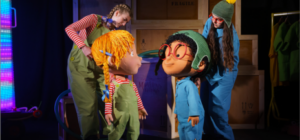
Sunday 22 September at 11am & 2pm
Tickets: £14 | Suitable for ages 3-8
Welcome to The Museum of Marvellous Things, where the impossible happens! Discover stars in jars, catch moons like balloons and dance with Doo-Dahs in cages. Because this is a museum like no other – it’s made from the magic of your imagination – and you get to bring it alive.
With giant puppets, magical effects, interactive storytelling, live original music and a chance to make your own special puppet.

This exhibition, Cuillin Bantock’s fourth at Highgate Gallery, will be the culmination of sixty five years of
experience as a visual artist.
Bantock’s work is all landscape-based. Life-long familiarity with a particular coastal sand-dune system in North
Wales is a persistent point of reference. His choice of media is wide-ranging and includes oil paint, acrylic, gouache,
conte and linocut. His approach has shifted from representation to abstraction, but he strongly believes that all
art must relate to something outside itself.
The exhibition will show two types of work: Indian Ink drawings, and watercolour paintings.
The Indian ink drawings are from the 2022 series ‘Forty-one approaches to a View’. The ‘view’ is of a particular
duneland studied repeatedly from the same spot. The emphasis has been on making quite simple statements
about that particular space. The first studies that Bantock made of this terrain (also in Indian ink) date from 1961.
It was only while making the recent drawings in 2022 that he realised that other artists, in their later years,
had adopted a similar approach; for example Hokusai, with his ‘Thirty Six Views of Mount Fuji’.
The watercolours were made between 2020 and 2024. These are derived from the same landscape as the
ink drawings, but with a particular emphasis on pictorial space (through flatness) and pictorial light
(through colour), but handled abstractly without reference to specific locales. To some extent the watercolours
are a new departure for Bantock. His only previous experience with the medium was very occasional figurative
work (again, of duneland). He describes watercolour as ‘the most challenging medium of all.’
The two bodies of work are united by a perennial search for clarity of execution and expression, and pictorial economy
free of didacticism, leaving room for spontaneity.
Cuillin Bantock has enjoyed a rich and varied career as artist, scientist, educator and writer. He is an Oxford-trained
zoologist who worked as a professional biologist for 20 years, and later studied at Camberwell College of Art. He has
written and lectured extensively on a wide range of subjects, including science, wildlife conservation, art and artists.
His work has been exhibited widely over many years, and is held in a large number of private and corporate collections.
Highgate Gallery is delighted to be hosting this exhibition, which Bantock has decided – as he approaches
his ninetieth birthday – shall be his last with us.
Gallery open: Wed – Fri: 13.00 – 17.00, Sat: 11.00 – 16.00, Sun: 11.00 -17.00

This exhibition, Cuillin Bantock’s fourth at Highgate Gallery, will be the culmination of sixty five years of
experience as a visual artist.
Bantock’s work is all landscape-based. Life-long familiarity with a particular coastal sand-dune system in North
Wales is a persistent point of reference. His choice of media is wide-ranging and includes oil paint, acrylic, gouache,
conte and linocut. His approach has shifted from representation to abstraction, but he strongly believes that all
art must relate to something outside itself.
The exhibition will show two types of work: Indian Ink drawings, and watercolour paintings.
The Indian ink drawings are from the 2022 series ‘Forty-one approaches to a View’. The ‘view’ is of a particular
duneland studied repeatedly from the same spot. The emphasis has been on making quite simple statements
about that particular space. The first studies that Bantock made of this terrain (also in Indian ink) date from 1961.
It was only while making the recent drawings in 2022 that he realised that other artists, in their later years,
had adopted a similar approach; for example Hokusai, with his ‘Thirty Six Views of Mount Fuji’.
The watercolours were made between 2020 and 2024. These are derived from the same landscape as the
ink drawings, but with a particular emphasis on pictorial space (through flatness) and pictorial light
(through colour), but handled abstractly without reference to specific locales. To some extent the watercolours
are a new departure for Bantock. His only previous experience with the medium was very occasional figurative
work (again, of duneland). He describes watercolour as ‘the most challenging medium of all.’
The two bodies of work are united by a perennial search for clarity of execution and expression, and pictorial economy
free of didacticism, leaving room for spontaneity.
Cuillin Bantock has enjoyed a rich and varied career as artist, scientist, educator and writer. He is an Oxford-trained
zoologist who worked as a professional biologist for 20 years, and later studied at Camberwell College of Art. He has
written and lectured extensively on a wide range of subjects, including science, wildlife conservation, art and artists.
His work has been exhibited widely over many years, and is held in a large number of private and corporate collections.
Highgate Gallery is delighted to be hosting this exhibition, which Bantock has decided – as he approaches
his ninetieth birthday – shall be his last with us.
Gallery open: Wed – Fri: 13.00 – 17.00, Sat: 11.00 – 16.00, Sun: 11.00 -17.00

This exhibition, Cuillin Bantock’s fourth at Highgate Gallery, will be the culmination of sixty five years of
experience as a visual artist.
Bantock’s work is all landscape-based. Life-long familiarity with a particular coastal sand-dune system in North
Wales is a persistent point of reference. His choice of media is wide-ranging and includes oil paint, acrylic, gouache,
conte and linocut. His approach has shifted from representation to abstraction, but he strongly believes that all
art must relate to something outside itself.
The exhibition will show two types of work: Indian Ink drawings, and watercolour paintings.
The Indian ink drawings are from the 2022 series ‘Forty-one approaches to a View’. The ‘view’ is of a particular
duneland studied repeatedly from the same spot. The emphasis has been on making quite simple statements
about that particular space. The first studies that Bantock made of this terrain (also in Indian ink) date from 1961.
It was only while making the recent drawings in 2022 that he realised that other artists, in their later years,
had adopted a similar approach; for example Hokusai, with his ‘Thirty Six Views of Mount Fuji’.
The watercolours were made between 2020 and 2024. These are derived from the same landscape as the
ink drawings, but with a particular emphasis on pictorial space (through flatness) and pictorial light
(through colour), but handled abstractly without reference to specific locales. To some extent the watercolours
are a new departure for Bantock. His only previous experience with the medium was very occasional figurative
work (again, of duneland). He describes watercolour as ‘the most challenging medium of all.’
The two bodies of work are united by a perennial search for clarity of execution and expression, and pictorial economy
free of didacticism, leaving room for spontaneity.
Cuillin Bantock has enjoyed a rich and varied career as artist, scientist, educator and writer. He is an Oxford-trained
zoologist who worked as a professional biologist for 20 years, and later studied at Camberwell College of Art. He has
written and lectured extensively on a wide range of subjects, including science, wildlife conservation, art and artists.
His work has been exhibited widely over many years, and is held in a large number of private and corporate collections.
Highgate Gallery is delighted to be hosting this exhibition, which Bantock has decided – as he approaches
his ninetieth birthday – shall be his last with us.
Gallery open: Wed – Fri: 13.00 – 17.00, Sat: 11.00 – 16.00, Sun: 11.00 -17.00
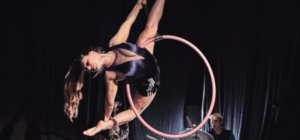
Brainfools is back at Jacksons Lane this autumn with a one-off scratch night! Get ready to witness circus artists showcase their works-in-progress. These nights provide a rare opportunity for performers to test new material, receive live feedback, and refine their pieces based on audience reactions.
Christine Watson: Journeys Through Colour
Pastels, Prints and Paintings
Christine Watson’s paintings, pastels and prints explore the essential qualities of cities, towns and villages
around the Mediterranean, places where bright daylight intensifies the richness of colours and the darkness
of shadows.
Christine’s work examines the passageways and stairways of towns and villages in Greece and the traditional
settlements of Morocco. Walls and roofs, windows and doors, streets and alleyways – the fabric of
habitation – are revealed as they are, aged by wear and weather. Her aim is to depict the relationship
between spaces and surfaces without sentiment or nostalgia.
“I employ different media to reflect on the abstract qualities of these places, their light and shade, their
textures and colours. Each piece of work represents part of my journey through a town or village, inspired
by restless curiosity to seek out what is around the corner or up the stairs – maybe the perfect image for a painting, pastel or print or even a pot of gold!”, she says.
Pastels and paintings highlight the colours characteristic of each location, using palettes that have endured
through the centuries. Pink and brown madder are the dominant colours of Marrakesh, reflecting the
surrounding mountains; yellow ochre and raw sienna are the principal hues of Fez, while Chefchaouen is
celebrated for its vibrant blues. And although Greek settlements are associated with blue-painted timber
work and whitewashed walls, closer scrutiny reveals much more richness. In Christine’s mezzotints, by
contrast, tone takes over from colour and serves to explore light and shade, textures and surfaces.
Christine Watson studied fine art at Winchester, The Slade and the British School at Rome, since when she
has exhibited widely. She is an elected member of the Pastel Society and an associate member of both the
Society of Women Artists and the Society of Graphic Fine Art.
Gallery times: Wednesdays to Fridays 13:00-17:00,
Saturdays & Sundays 10:00-16:00
Mondays & Tuesdays Closed
Private View: Friday 11 October 2024 18:00-20:30
Christine Watson: Journeys Through Colour
Pastels, Prints and Paintings
Christine Watson’s paintings, pastels and prints explore the essential qualities of cities, towns and villages
around the Mediterranean, places where bright daylight intensifies the richness of colours and the darkness
of shadows.
Christine’s work examines the passageways and stairways of towns and villages in Greece and the traditional
settlements of Morocco. Walls and roofs, windows and doors, streets and alleyways – the fabric of
habitation – are revealed as they are, aged by wear and weather. Her aim is to depict the relationship
between spaces and surfaces without sentiment or nostalgia.
“I employ different media to reflect on the abstract qualities of these places, their light and shade, their
textures and colours. Each piece of work represents part of my journey through a town or village, inspired
by restless curiosity to seek out what is around the corner or up the stairs – maybe the perfect image for a painting, pastel or print or even a pot of gold!”, she says.
Pastels and paintings highlight the colours characteristic of each location, using palettes that have endured
through the centuries. Pink and brown madder are the dominant colours of Marrakesh, reflecting the
surrounding mountains; yellow ochre and raw sienna are the principal hues of Fez, while Chefchaouen is
celebrated for its vibrant blues. And although Greek settlements are associated with blue-painted timber
work and whitewashed walls, closer scrutiny reveals much more richness. In Christine’s mezzotints, by
contrast, tone takes over from colour and serves to explore light and shade, textures and surfaces.
Christine Watson studied fine art at Winchester, The Slade and the British School at Rome, since when she
has exhibited widely. She is an elected member of the Pastel Society and an associate member of both the
Society of Women Artists and the Society of Graphic Fine Art.
Gallery times: Wednesdays to Fridays 13:00-17:00,
Saturdays & Sundays 10:00-16:00
Mondays & Tuesdays Closed
Private View: Friday 11 October 2024 18:00-20:30

Sunday 13 October at 11.30am & 2pm
Tickets: £14 | Suitable for ages 4+
M6 Theatre presents A Tiger’s Tale, a fantastical production by award-winning playwright Mike Kenny. Based on the true story of Fenella, the Holmfirth Tiger, this high-spirited show features circus, puppetry, live music, and song. Follow the unbelievable journey of acrobats and their adopted tiger cub from South Africa to West Yorkshire.
Christine Watson: Journeys Through Colour
Pastels, Prints and Paintings
Christine Watson’s paintings, pastels and prints explore the essential qualities of cities, towns and villages
around the Mediterranean, places where bright daylight intensifies the richness of colours and the darkness
of shadows.
Christine’s work examines the passageways and stairways of towns and villages in Greece and the traditional
settlements of Morocco. Walls and roofs, windows and doors, streets and alleyways – the fabric of
habitation – are revealed as they are, aged by wear and weather. Her aim is to depict the relationship
between spaces and surfaces without sentiment or nostalgia.
“I employ different media to reflect on the abstract qualities of these places, their light and shade, their
textures and colours. Each piece of work represents part of my journey through a town or village, inspired
by restless curiosity to seek out what is around the corner or up the stairs – maybe the perfect image for a painting, pastel or print or even a pot of gold!”, she says.
Pastels and paintings highlight the colours characteristic of each location, using palettes that have endured
through the centuries. Pink and brown madder are the dominant colours of Marrakesh, reflecting the
surrounding mountains; yellow ochre and raw sienna are the principal hues of Fez, while Chefchaouen is
celebrated for its vibrant blues. And although Greek settlements are associated with blue-painted timber
work and whitewashed walls, closer scrutiny reveals much more richness. In Christine’s mezzotints, by
contrast, tone takes over from colour and serves to explore light and shade, textures and surfaces.
Christine Watson studied fine art at Winchester, The Slade and the British School at Rome, since when she
has exhibited widely. She is an elected member of the Pastel Society and an associate member of both the
Society of Women Artists and the Society of Graphic Fine Art.
Gallery times: Wednesdays to Fridays 13:00-17:00,
Saturdays & Sundays 10:00-16:00
Mondays & Tuesdays Closed
Private View: Friday 11 October 2024 18:00-20:30
Christine Watson: Journeys Through Colour
Pastels, Prints and Paintings
Christine Watson’s paintings, pastels and prints explore the essential qualities of cities, towns and villages
around the Mediterranean, places where bright daylight intensifies the richness of colours and the darkness
of shadows.
Christine’s work examines the passageways and stairways of towns and villages in Greece and the traditional
settlements of Morocco. Walls and roofs, windows and doors, streets and alleyways – the fabric of
habitation – are revealed as they are, aged by wear and weather. Her aim is to depict the relationship
between spaces and surfaces without sentiment or nostalgia.
“I employ different media to reflect on the abstract qualities of these places, their light and shade, their
textures and colours. Each piece of work represents part of my journey through a town or village, inspired
by restless curiosity to seek out what is around the corner or up the stairs – maybe the perfect image for a painting, pastel or print or even a pot of gold!”, she says.
Pastels and paintings highlight the colours characteristic of each location, using palettes that have endured
through the centuries. Pink and brown madder are the dominant colours of Marrakesh, reflecting the
surrounding mountains; yellow ochre and raw sienna are the principal hues of Fez, while Chefchaouen is
celebrated for its vibrant blues. And although Greek settlements are associated with blue-painted timber
work and whitewashed walls, closer scrutiny reveals much more richness. In Christine’s mezzotints, by
contrast, tone takes over from colour and serves to explore light and shade, textures and surfaces.
Christine Watson studied fine art at Winchester, The Slade and the British School at Rome, since when she
has exhibited widely. She is an elected member of the Pastel Society and an associate member of both the
Society of Women Artists and the Society of Graphic Fine Art.
Gallery times: Wednesdays to Fridays 13:00-17:00,
Saturdays & Sundays 10:00-16:00
Mondays & Tuesdays Closed
Private View: Friday 11 October 2024 18:00-20:30
Christine Watson: Journeys Through Colour
Pastels, Prints and Paintings
Christine Watson’s paintings, pastels and prints explore the essential qualities of cities, towns and villages
around the Mediterranean, places where bright daylight intensifies the richness of colours and the darkness
of shadows.
Christine’s work examines the passageways and stairways of towns and villages in Greece and the traditional
settlements of Morocco. Walls and roofs, windows and doors, streets and alleyways – the fabric of
habitation – are revealed as they are, aged by wear and weather. Her aim is to depict the relationship
between spaces and surfaces without sentiment or nostalgia.
“I employ different media to reflect on the abstract qualities of these places, their light and shade, their
textures and colours. Each piece of work represents part of my journey through a town or village, inspired
by restless curiosity to seek out what is around the corner or up the stairs – maybe the perfect image for a painting, pastel or print or even a pot of gold!”, she says.
Pastels and paintings highlight the colours characteristic of each location, using palettes that have endured
through the centuries. Pink and brown madder are the dominant colours of Marrakesh, reflecting the
surrounding mountains; yellow ochre and raw sienna are the principal hues of Fez, while Chefchaouen is
celebrated for its vibrant blues. And although Greek settlements are associated with blue-painted timber
work and whitewashed walls, closer scrutiny reveals much more richness. In Christine’s mezzotints, by
contrast, tone takes over from colour and serves to explore light and shade, textures and surfaces.
Christine Watson studied fine art at Winchester, The Slade and the British School at Rome, since when she
has exhibited widely. She is an elected member of the Pastel Society and an associate member of both the
Society of Women Artists and the Society of Graphic Fine Art.
Gallery times: Wednesdays to Fridays 13:00-17:00,
Saturdays & Sundays 10:00-16:00
Mondays & Tuesdays Closed
Private View: Friday 11 October 2024 18:00-20:30
Christine Watson: Journeys Through Colour
Pastels, Prints and Paintings
Christine Watson’s paintings, pastels and prints explore the essential qualities of cities, towns and villages
around the Mediterranean, places where bright daylight intensifies the richness of colours and the darkness
of shadows.
Christine’s work examines the passageways and stairways of towns and villages in Greece and the traditional
settlements of Morocco. Walls and roofs, windows and doors, streets and alleyways – the fabric of
habitation – are revealed as they are, aged by wear and weather. Her aim is to depict the relationship
between spaces and surfaces without sentiment or nostalgia.
“I employ different media to reflect on the abstract qualities of these places, their light and shade, their
textures and colours. Each piece of work represents part of my journey through a town or village, inspired
by restless curiosity to seek out what is around the corner or up the stairs – maybe the perfect image for a painting, pastel or print or even a pot of gold!”, she says.
Pastels and paintings highlight the colours characteristic of each location, using palettes that have endured
through the centuries. Pink and brown madder are the dominant colours of Marrakesh, reflecting the
surrounding mountains; yellow ochre and raw sienna are the principal hues of Fez, while Chefchaouen is
celebrated for its vibrant blues. And although Greek settlements are associated with blue-painted timber
work and whitewashed walls, closer scrutiny reveals much more richness. In Christine’s mezzotints, by
contrast, tone takes over from colour and serves to explore light and shade, textures and surfaces.
Christine Watson studied fine art at Winchester, The Slade and the British School at Rome, since when she
has exhibited widely. She is an elected member of the Pastel Society and an associate member of both the
Society of Women Artists and the Society of Graphic Fine Art.
Gallery times: Wednesdays to Fridays 13:00-17:00,
Saturdays & Sundays 10:00-16:00
Mondays & Tuesdays Closed
Private View: Friday 11 October 2024 18:00-20:30
Christine Watson: Journeys Through Colour
Pastels, Prints and Paintings
Christine Watson’s paintings, pastels and prints explore the essential qualities of cities, towns and villages
around the Mediterranean, places where bright daylight intensifies the richness of colours and the darkness
of shadows.
Christine’s work examines the passageways and stairways of towns and villages in Greece and the traditional
settlements of Morocco. Walls and roofs, windows and doors, streets and alleyways – the fabric of
habitation – are revealed as they are, aged by wear and weather. Her aim is to depict the relationship
between spaces and surfaces without sentiment or nostalgia.
“I employ different media to reflect on the abstract qualities of these places, their light and shade, their
textures and colours. Each piece of work represents part of my journey through a town or village, inspired
by restless curiosity to seek out what is around the corner or up the stairs – maybe the perfect image for a painting, pastel or print or even a pot of gold!”, she says.
Pastels and paintings highlight the colours characteristic of each location, using palettes that have endured
through the centuries. Pink and brown madder are the dominant colours of Marrakesh, reflecting the
surrounding mountains; yellow ochre and raw sienna are the principal hues of Fez, while Chefchaouen is
celebrated for its vibrant blues. And although Greek settlements are associated with blue-painted timber
work and whitewashed walls, closer scrutiny reveals much more richness. In Christine’s mezzotints, by
contrast, tone takes over from colour and serves to explore light and shade, textures and surfaces.
Christine Watson studied fine art at Winchester, The Slade and the British School at Rome, since when she
has exhibited widely. She is an elected member of the Pastel Society and an associate member of both the
Society of Women Artists and the Society of Graphic Fine Art.
Gallery times: Wednesdays to Fridays 13:00-17:00,
Saturdays & Sundays 10:00-16:00
Mondays & Tuesdays Closed
Private View: Friday 11 October 2024 18:00-20:30

After a sold-out debut, Queer Euphoria returns this autumn with even more excitement. Curated by Associate Artist Zaki Musa, this showcase celebrates the boundless creativity and talent of queer visionaries in circus and cabaret. Each act is a bold testament to the creative vision of queer artists, defying convention and challenging the status quo.
Christine Watson: Journeys Through Colour
Pastels, Prints and Paintings
Christine Watson’s paintings, pastels and prints explore the essential qualities of cities, towns and villages
around the Mediterranean, places where bright daylight intensifies the richness of colours and the darkness
of shadows.
Christine’s work examines the passageways and stairways of towns and villages in Greece and the traditional
settlements of Morocco. Walls and roofs, windows and doors, streets and alleyways – the fabric of
habitation – are revealed as they are, aged by wear and weather. Her aim is to depict the relationship
between spaces and surfaces without sentiment or nostalgia.
“I employ different media to reflect on the abstract qualities of these places, their light and shade, their
textures and colours. Each piece of work represents part of my journey through a town or village, inspired
by restless curiosity to seek out what is around the corner or up the stairs – maybe the perfect image for a painting, pastel or print or even a pot of gold!”, she says.
Pastels and paintings highlight the colours characteristic of each location, using palettes that have endured
through the centuries. Pink and brown madder are the dominant colours of Marrakesh, reflecting the
surrounding mountains; yellow ochre and raw sienna are the principal hues of Fez, while Chefchaouen is
celebrated for its vibrant blues. And although Greek settlements are associated with blue-painted timber
work and whitewashed walls, closer scrutiny reveals much more richness. In Christine’s mezzotints, by
contrast, tone takes over from colour and serves to explore light and shade, textures and surfaces.
Christine Watson studied fine art at Winchester, The Slade and the British School at Rome, since when she
has exhibited widely. She is an elected member of the Pastel Society and an associate member of both the
Society of Women Artists and the Society of Graphic Fine Art.
Gallery times: Wednesdays to Fridays 13:00-17:00,
Saturdays & Sundays 10:00-16:00
Mondays & Tuesdays Closed
Private View: Friday 11 October 2024 18:00-20:30

Sunday 20 October at 11am & 2pm
Tickets: £14 | Suitable for ages 1+
Join Ray, International Bubbleologist and Guinness World Record Holder, on his quest to complete the bubble game and create the ultimate bubble. This fast-paced show is brimming with high energy and surprises as Ray uses various gases to craft incredible bubble sculptures, effects, and magical displays.
Christine Watson: Journeys Through Colour
Pastels, Prints and Paintings
Christine Watson’s paintings, pastels and prints explore the essential qualities of cities, towns and villages
around the Mediterranean, places where bright daylight intensifies the richness of colours and the darkness
of shadows.
Christine’s work examines the passageways and stairways of towns and villages in Greece and the traditional
settlements of Morocco. Walls and roofs, windows and doors, streets and alleyways – the fabric of
habitation – are revealed as they are, aged by wear and weather. Her aim is to depict the relationship
between spaces and surfaces without sentiment or nostalgia.
“I employ different media to reflect on the abstract qualities of these places, their light and shade, their
textures and colours. Each piece of work represents part of my journey through a town or village, inspired
by restless curiosity to seek out what is around the corner or up the stairs – maybe the perfect image for a painting, pastel or print or even a pot of gold!”, she says.
Pastels and paintings highlight the colours characteristic of each location, using palettes that have endured
through the centuries. Pink and brown madder are the dominant colours of Marrakesh, reflecting the
surrounding mountains; yellow ochre and raw sienna are the principal hues of Fez, while Chefchaouen is
celebrated for its vibrant blues. And although Greek settlements are associated with blue-painted timber
work and whitewashed walls, closer scrutiny reveals much more richness. In Christine’s mezzotints, by
contrast, tone takes over from colour and serves to explore light and shade, textures and surfaces.
Christine Watson studied fine art at Winchester, The Slade and the British School at Rome, since when she
has exhibited widely. She is an elected member of the Pastel Society and an associate member of both the
Society of Women Artists and the Society of Graphic Fine Art.
Gallery times: Wednesdays to Fridays 13:00-17:00,
Saturdays & Sundays 10:00-16:00
Mondays & Tuesdays Closed
Private View: Friday 11 October 2024 18:00-20:30
Christine Watson: Journeys Through Colour
Pastels, Prints and Paintings
Christine Watson’s paintings, pastels and prints explore the essential qualities of cities, towns and villages
around the Mediterranean, places where bright daylight intensifies the richness of colours and the darkness
of shadows.
Christine’s work examines the passageways and stairways of towns and villages in Greece and the traditional
settlements of Morocco. Walls and roofs, windows and doors, streets and alleyways – the fabric of
habitation – are revealed as they are, aged by wear and weather. Her aim is to depict the relationship
between spaces and surfaces without sentiment or nostalgia.
“I employ different media to reflect on the abstract qualities of these places, their light and shade, their
textures and colours. Each piece of work represents part of my journey through a town or village, inspired
by restless curiosity to seek out what is around the corner or up the stairs – maybe the perfect image for a painting, pastel or print or even a pot of gold!”, she says.
Pastels and paintings highlight the colours characteristic of each location, using palettes that have endured
through the centuries. Pink and brown madder are the dominant colours of Marrakesh, reflecting the
surrounding mountains; yellow ochre and raw sienna are the principal hues of Fez, while Chefchaouen is
celebrated for its vibrant blues. And although Greek settlements are associated with blue-painted timber
work and whitewashed walls, closer scrutiny reveals much more richness. In Christine’s mezzotints, by
contrast, tone takes over from colour and serves to explore light and shade, textures and surfaces.
Christine Watson studied fine art at Winchester, The Slade and the British School at Rome, since when she
has exhibited widely. She is an elected member of the Pastel Society and an associate member of both the
Society of Women Artists and the Society of Graphic Fine Art.
Gallery times: Wednesdays to Fridays 13:00-17:00,
Saturdays & Sundays 10:00-16:00
Mondays & Tuesdays Closed
Private View: Friday 11 October 2024 18:00-20:30

Sat 26 – Sun 27 October 11am & 2pm
Tickets: £16 | Aimed at 5+
Winners of the Best Children’s Presentation at the Adelaide Fringe Festival and runners-up for the Children’s Choice Award at the Edinburgh Fringe Festival, the Trash Test Dummies take wheelie bins to new heights.
Enjoy side-splitting slapstick comedy, daring acrobatics, and dexterous juggling in an imaginative adventure that’s anything but garbage. With ballet, balloons, and “adept unadulterated mischief” (The Times), this show promises an hour of non-stop hilarity!
